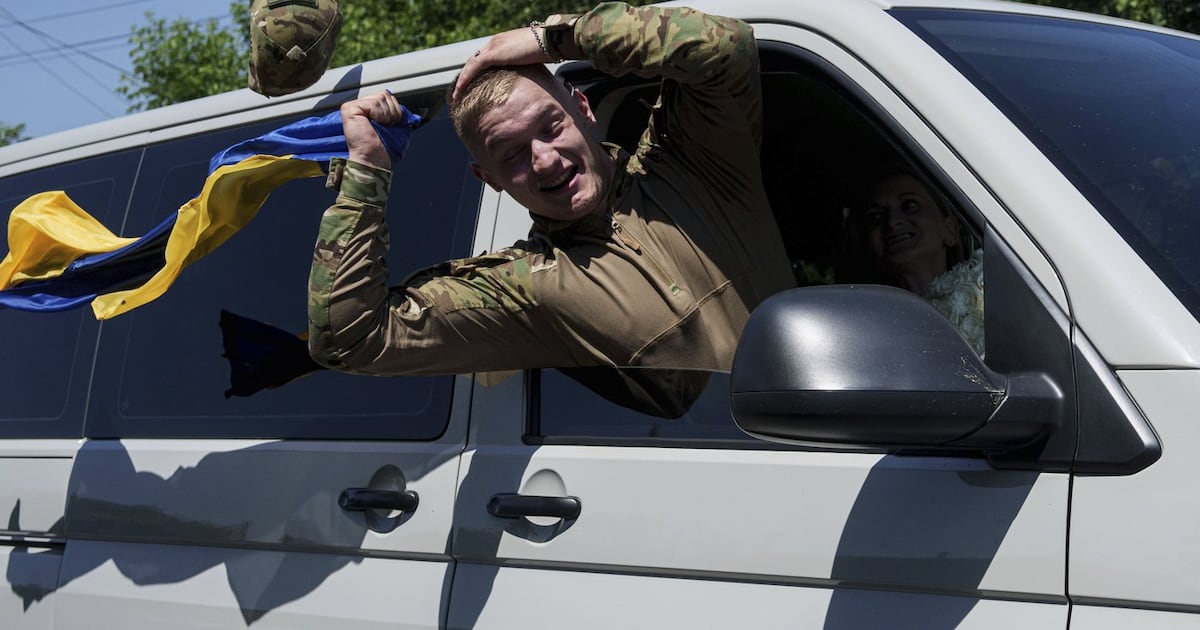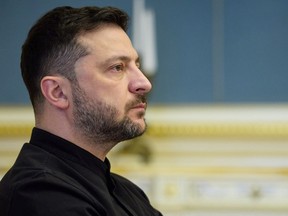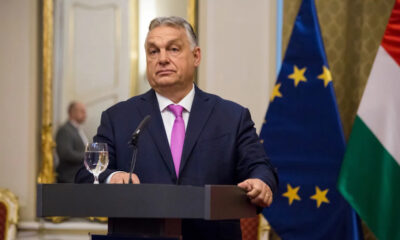Top Stories
Ukrainian Soldiers Rebuild Lives Post-Prison: Urgent Counseling Needed

UPDATE: Ukrainian soldiers released from Russian captivity are urgently seeking counseling to rebuild their lives after enduring severe trauma. Since his release in April, Stanislav Tarnavskyi, 25, has rapidly transitioned to civilian life, proposing to his girlfriend and adopting a dog, yet he continues to grapple with haunting memories of his three years in prison.
Just this week, Tarnavskyi proposed to Tetiana Baieva in a photography studio in Kyiv, celebrating their reunion after his harrowing experience as a prisoner of war. “I see the officers who watched over us. I dream they want to harm me,” he revealed, capturing the enduring psychological scars faced by him and countless others.
The U.N. has reported that many former POWs, over 5,000 in total, suffered brutal treatment including beatings and starvation, leaving emotional and psychological wounds that require ongoing support. Experts emphasize the necessity of long-term counseling for these veterans, as the effects of war can echo for generations.
In the serene surroundings of the Lisova Polyana mental health center, Tarnavskyi and other veterans work on their recovery, participating in therapy sessions that address the trauma of captivity. “You can’t fool yourself… it will always haunt you,” said Denys Zalizko, a 21-year-old former POW who has also begun to heal after his release just months ago.
Zalizko, who endured severe torture and near-suicide experiences during his 15 months in captivity, is now focusing on music and exercise to manage his anxiety. “Pauses and stillness bring anxiety,” he explained, as he navigates the challenges of reintegrating into society.
The psychological impact of their experiences cannot be understated. Kseniia Voznitsyna, director of the mental health center, states that former POWs often experience hyper-vigilance, struggling with trust and isolation. These symptoms can persist long after their release, making continuous psychological support essential.
As the war continues, the journeys of Tarnavskyi and Zalizko highlight the profound need for compassionate care and understanding for the thousands of soldiers who have faced unimaginable hardships. Their resilience is commendable, but the path to healing is ongoing and fraught with challenges.
With increasing recognition of their needs, both soldiers represent a growing call for society to provide the necessary resources and support as they rebuild their lives in a country still grappling with the impacts of war.
As they strive for normalcy, the emotional scars of captivity remain a daily battle, underscoring the urgent need for dedicated mental health initiatives to support these brave individuals. The stories of Tarnavskyi and Zalizko are not just personal victories; they are a testament to the collective struggle of many veterans seeking to reclaim their lives in a war-torn nation.
-

 Politics4 weeks ago
Politics4 weeks agoSecwepemc First Nation Seeks Aboriginal Title Over Kamloops Area
-

 World5 months ago
World5 months agoScientists Unearth Ancient Antarctic Ice to Unlock Climate Secrets
-

 Entertainment5 months ago
Entertainment5 months agoTrump and McCormick to Announce $70 Billion Energy Investments
-

 Science5 months ago
Science5 months agoFour Astronauts Return to Earth After International Space Station Mission
-

 Lifestyle5 months ago
Lifestyle5 months agoTransLink Launches Food Truck Program to Boost Revenue in Vancouver
-

 Technology3 months ago
Technology3 months agoApple Notes Enhances Functionality with Markdown Support in macOS 26
-

 Lifestyle3 months ago
Lifestyle3 months agoManitoba’s Burger Champion Shines Again Amid Dining Innovations
-

 Top Stories2 months ago
Top Stories2 months agoUrgent Update: Fatal Crash on Highway 99 Claims Life of Pitt Meadows Man
-

 Politics4 months ago
Politics4 months agoUkrainian Tennis Star Elina Svitolina Faces Death Threats Online
-

 Sports5 months ago
Sports5 months agoSearch Underway for Missing Hunter Amid Hokkaido Bear Emergency
-

 Politics5 months ago
Politics5 months agoCarney Engages First Nations Leaders at Development Law Summit
-

 Technology5 months ago
Technology5 months agoFrosthaven Launches Early Access on July 31, 2025





















